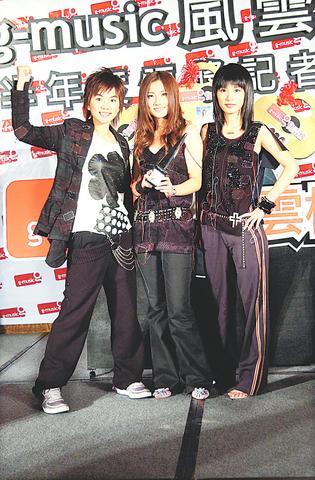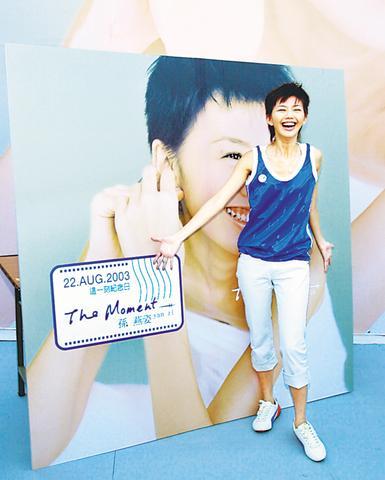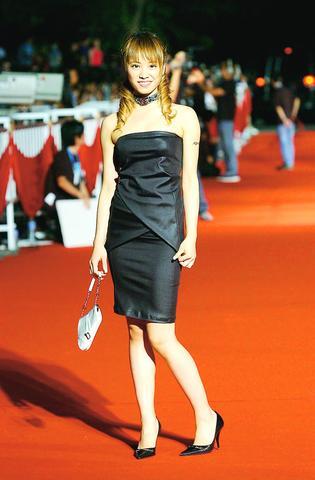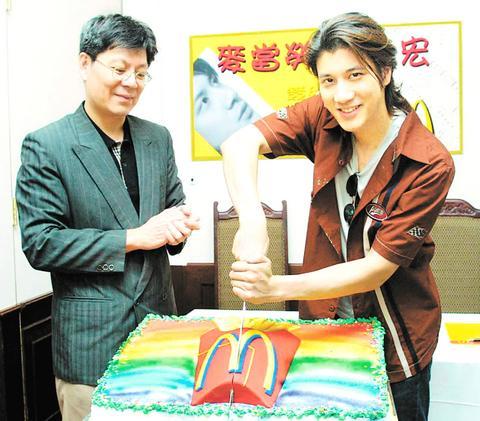It's no secret that Hong Kong singer/actress Anita Mui (梅艷芳) has had some health problems of late, but Next Magazine (壹週刊) seems to be wandering onto thin legal ice in its latest issue by announcing that Mui is suffering from cervical cancer.
Mui has tried to silence the reports in the Hong Kong media about her health problems, to no avail, and threatened to sue anyone who writes erroneous stories on the subject. Never one to fear a lawsuit, Next references unnamed sources to back its claim that Mui has come down with the deadly disease. As evidence, the report says her family allegedly has been burning a lot of ghost money and carrying out various prayer rituals. Also, she's wearing black-bead bracelets that carry religious significance, and spent a night in hospital two weeks ago, where she received numerous mid-night hospital visits from famous friends like William So (蘇永康) and Nicholas Tse (謝霆鋒).

Mui said, however, that her hospital stay was not to treat anything as serious as the tabloids were suggesting. But so far, she hasn't clearly stated what ailment she is suffering from. The ominous element in the story is the fact that her sister died of cervical cancer three years ago at the age of 41.

Leaving the serious stuff behind and diving into the inane news that Pop Stop enjoys most, the gloves have come off and the claws are out in the battle between Sun Yanzi (孫燕姿) fans and S.H.E. fans after the g-music billboard chart was released last week. The chart showed that Yanzi had edged out the cutesy trio of Selina (S), Hebe (H) and Ella (E) to grab first place in sales and since then S.H.E. fans have been going for the jugular in online chat rooms. In the first week of its release on Aug. 22, Yanzi's album The Moment sold over 250,000 copies, just a few thousand more than S.H.E.
Selina and Hebe may have fed the flames of their fans' ire by telling media after the results came out that no matter what the chart says, "S.H.E.'s album will always be number one in our hearts and in the hearts of our fans."

The messages posted by rabid fans were so vitriolic, top executives for Yanzi and S.H.E.'s respective record labels tried to urge restraint from fans and praised their competitors. The calls for harmony are nice, but Pop Stop is really hoping for a rumble in Hsimenting between the two camps.

Leaving the pettiness of Taiwan teenie bopper fans behind, doe-eyed singer Jolin Tsai (蔡依林) took her show to Las Vegas, of all places, for a one-off concert last weekend at the Mandalay Bay resort and casino. It's not certain how many Chinese music fans made the trek to Las Vegas for the show, but she probably doesn't care, the one-hour show earned her a cool NT$2.5 million.
Also earning a quick American buck recently is Lee Hom Wang (王力宏), who signed up with McDonald's for the company's new international ad campaign. Lee Hom will be the voice in Chinese-speaking areas for the four-minute ditty composed by McDonald's headquarters. Just for recording the song, Lee Hom is reportedly raking in over seven figures, albeit in NT dollars.
Lee Hom will be performing in Taipei on Oct. 11 so if you haven't seen the ad on TV by then, you can probably hear the song at the show.
If we're to believe the Liberty Times (自由時報), the past week has seen an invasion of foreign stars looking to run off with Taiwanese people's money.
"If Taiwan's entertainment industry can't improve itself and create a larger space for the arts, then sooner or later, foreign artists will run away with our money," said the paper's column "Scissors" (剪刀) in its edition last Thursday. The column followed up on Tuesday in a piece titled "Korean stars aren't gods" by pillorying Korean TV star Han Jae-seok (韓在石) for failing to show up at a press conference. According to the column, the actor, who was reported to have had to attend an urgent meeting at the time, was not showing the proper respect to the Taiwanese press.
Pop Stop will be curious to see if "Scissors" has anything to say about Japanese E-cup porn star Asakawa Ran coming to Taiwan to launch a new career. Whatever she does, it won't be porn, because that's illegal here, and anyway, the market was cornered by that Taiwan Plumber (台灣水電工) movie that's all over the Web.

The primaries for this year’s nine-in-one local elections in November began early in this election cycle, starting last autumn. The local press has been full of tales of intrigue, betrayal, infighting and drama going back to the summer of 2024. This is not widely covered in the English-language press, and the nine-in-one elections are not well understood. The nine-in-one elections refer to the nine levels of local governments that go to the ballot, from the neighborhood and village borough chief level on up to the city mayor and county commissioner level. The main focus is on the 22 special municipality

The People’s Republic of China (PRC) invaded Vietnam in 1979, following a year of increasingly tense relations between the two states. Beijing viewed Vietnam’s close relations with Soviet Russia as a threat. One of the pretexts it used was the alleged mistreatment of the ethnic Chinese in Vietnam. Tension between the ethnic Chinese and governments in Vietnam had been ongoing for decades. The French used to play off the Vietnamese against the Chinese as a divide-and-rule strategy. The Saigon government in 1956 compelled all Vietnam-born Chinese to adopt Vietnamese citizenship. It also banned them from 11 trades they had previously

In the 2010s, the Communist Party of China (CCP) began cracking down on Christian churches. Media reports said at the time that various versions of Protestant Christianity were likely the fastest growing religions in the People’s Republic of China (PRC). The crackdown was part of a campaign that in turn was part of a larger movement to bring religion under party control. For the Protestant churches, “the government’s aim has been to force all churches into the state-controlled organization,” according to a 2023 article in Christianity Today. That piece was centered on Wang Yi (王怡), the fiery, charismatic pastor of the

Hsu Pu-liao (許不了) never lived to see the premiere of his most successful film, The Clown and the Swan (小丑與天鵝, 1985). The movie, which starred Hsu, the “Taiwanese Charlie Chaplin,” outgrossed Jackie Chan’s Heart of Dragon (龍的心), earning NT$9.2 million at the local box office. Forty years after its premiere, the film has become the Taiwan Film and Audiovisual Institute’s (TFAI) 100th restoration. “It is the only one of Hsu’s films whose original negative survived,” says director Kevin Chu (朱延平), one of Taiwan’s most commercially successful